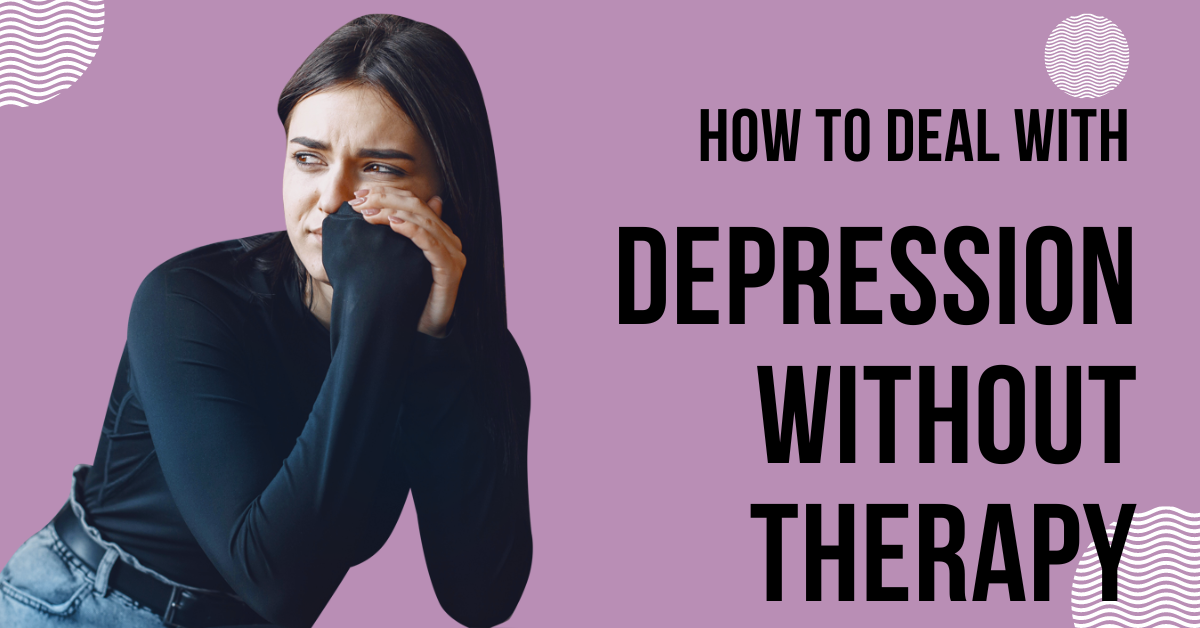Depression is a common but serious mental health condition that affects millions of people around the world. It can lead to feelings of sadness, hopelessness, and a lack of interest in things that once brought joy.
While therapy is a proven and effective treatment for depression, not everyone is comfortable with the idea of therapy or may not have access to it. In this article, we will explore non-therapy options for dealing with depression and provide practical tips for overcoming the symptoms of depression.
My goal is to provide information and support for those who are seeking to improve their mental health without relying solely on therapy. So, if you or someone you know is struggling with depression, read on to learn more about the different ways you can take care of yourself and start feeling better.
Understanding Depression
Understanding depression is an important step in dealing with it effectively. Depression is a complex condition that can have a range of symptoms, including persistent feelings of sadness, hopelessness, and a loss of interest in things that were once enjoyable. It can also cause physical symptoms such as fatigue, changes in appetite and sleep patterns, and a loss of energy.
Depression can have a variety of causes, including biological, genetic, environmental, and psychological factors. It may be triggered by a significant life event such as the loss of a loved one, a relationship breakup, or financial stress. It can also be a side effect of certain medical conditions, medications, or substance abuse.
Recognizing the signs and symptoms of depression is the first step in seeking help. While it can be difficult to identify depression in oneself, some common symptoms include feelings of sadness and hopelessness that persist for two weeks or more, a lack of interest in activities once enjoyed, changes in sleep patterns, and feelings of worthlessness or guilt. If you are experiencing these symptoms, it is important to seek help from a trusted friend, family member, or mental health professional.
In conclusion, depression is a common and serious mental health condition that affects millions of people around the world. Understanding the symptoms, causes, and importance of recognizing depression is crucial in seeking and finding effective treatment. While therapy is a common and effective treatment option, non-therapy options such as exercise, mindfulness, and support from friends and family can also help manage the symptoms of depression.
Causes of dePRESSION
Depression can have a range of causes, including biological, genetic, environmental, and psychological factors. Some of the most common causes of depression include:
Biological causes: Depression can be caused by imbalances in brain chemicals, such as serotonin and norepinephrine, that regulate mood. Hormonal changes, such as those that occur during pregnancy, menopause, or thyroid problems, can also contribute to depression.
Genetic factors: Depression can run in families, and research has shown that there is a genetic component to the condition. If you have a family history of depression, you may be at a higher risk for developing the condition.
Environmental factors: Life events, such as the loss of a loved one, a relationship breakup, or financial stress, can trigger depression. Chronic stress and abuse, whether physical, emotional, or sexual, can also lead to depression.
Psychological factors: Negative thought patterns and beliefs, such as low self-esteem, perfectionism, and a tendency to blame oneself, can contribute to depression. Chronic stress and a history of trauma can also play a role in the development of depression.
Addressing depression is crucial for improving mental health and quality of life. It is important to seek help from a mental health professional if you are experiencing symptoms of depression, such as persistent feelings of sadness, hopelessness, and a loss of interest in things you once enjoyed.
There are many effective treatments for depression, including therapy, medication, and lifestyle changes. In addition, support from friends, family, and peer support groups can also be helpful in managing the symptoms of depression.
In conclusion, understanding the causes of depression is important for seeking effective treatment and support. While depression can be caused by a range of factors, there are many effective treatments available, including therapy, medication, and lifestyle changes. If you are experiencing symptoms of depression, reach out to a trusted friend, family member, or mental health professional for help and support.
Importance of recognizing depression
Recognizing depression is crucial for seeking help and improving mental health. Depression can be a debilitating condition that affects a person’s daily life, relationships, and overall well-being. However, many people who are struggling with depression may not realize that they have the condition, or may be ashamed or embarrassed to seek help.
The importance of recognizing depression cannot be overstated. Depression is a treatable condition, and early recognition and treatment can help prevent the condition from becoming more severe and causing lasting damage to a person’s mental and physical health. By recognizing the symptoms of depression and seeking help, individuals can take control of their mental health and start on the road to recovery.
Recognizing depression involves paying attention to changes in mood, behavior, and overall functioning. Some common symptoms of depression include persistent feelings of sadness, hopelessness, and a loss of interest in things that once brought joy. Changes in sleep patterns, appetite, and energy levels can also be signs of depression.
It is important to remember that everyone experiences depression differently, and there is no “right” or “wrong” way to experience the condition. If you are struggling with depression, it is important to seek help from a trusted friend, family member, or mental health professional. With the right support and treatment, it is possible to manage the symptoms of depression and improve mental health.
In conclusion, recognizing depression is a crucial step in seeking help and improving mental health. Depression is a treatable condition, and early recognition and treatment can help prevent the condition from becoming more severe. By paying attention to changes in mood, behavior, and overall functioning, individuals can take control of their mental health and start on the road to recovery.
Non-Therapy Options for Dealing with Depression
- A. Exercise and physical activity
- B. Mindfulness and meditation
- C. Healthy diet and nutrition
- D. Good sleep habits
- E. Social support
- F. Creative activities
- G. Seeking support from friends and family
Exercise and physical activity
Exercise and physical activity are effective non-therapy options for dealing with depression. Regular physical activity has been shown to improve mood, reduce stress, and enhance overall well-being. In addition, exercise releases endorphins, the body’s natural feel-good chemicals, which can help alleviate symptoms of depression and improve mood.
Physical activity can take many forms, from brisk walks to more strenuous forms of exercise such as running, cycling, or weightlifting. The key is to find an activity that you enjoy and that is easily incorporated into your daily routine. Even moderate exercise, such as a 30-minute walk, can have a positive impact on mental health and well-being.Incorporating physical activity into your daily routine can help manage the symptoms of depression in several ways.
First, it can provide a sense of accomplishment and boost self-esteem, which can be especially helpful for those who are struggling with feelings of hopelessness and worthlessness.
Second, it can provide a distraction from negative thoughts and help break the cycle of rumination that can be a hallmark of depression.
Finally, physical activity can help improve sleep, which is crucial for overall mental and physical health.In conclusion, exercise and physical activity are effective non-therapy options for dealing with depression. Regular physical activity can help improve mood, reduce stress, and enhance overall well-being.
By finding an activity that you enjoy and incorporating it into your daily routine, you can take control of your mental health and start on the road to recovery.
Healthy diet and nutrition
A healthy diet and proper nutrition can play a significant role in managing the symptoms of depression. The foods we eat can impact our mood, energy levels, and overall well-being. By incorporating healthy, nutrient-rich foods into your diet, you can help support your mental health and alleviate symptoms of depression.
A diet that is rich in whole foods, such as fruits, vegetables, whole grains, and lean protein, can provide the essential nutrients and vitamins needed to support mental health. In particular, omega-3 fatty acids, found in fatty fish such as salmon, have been shown to have a positive impact on mood and may help alleviate symptoms of depression. Vitamin B-12 , found in animal products such as meat, eggs, and dairy, is also important for maintaining good mental health.
In addition, avoiding processed and junk foods, which are high in sugar, unhealthy fats, and artificial additives, can help improve mood and reduce symptoms of depression. Studies have shown that a diet high in sugar and processed foods can worsen mood and increase symptoms of depression and anxiety.
It is also important to maintain a balanced and consistent eating pattern, as irregular meals and skipping meals can lead to low blood sugar levels, which can negatively impact mood and energy levels.
In conclusion, a healthy diet and proper nutrition can play a significant role in managing the symptoms of depression. By incorporating healthy, nutrient-rich foods into your diet and avoiding processed and junk foods, you can help support your mental health and alleviate symptoms of depression. Maintaining a balanced and consistent eating pattern is also important for overall mental and physical health.
Good sleep habits
Good sleep habits are crucial for managing the symptoms of depression. Sleep plays an important role in regulating mood and improving overall mental health, and a lack of quality sleep can worsen symptoms of depression.
Establishing a consistent sleep routine is the first step to improving sleep quality. This may include going to bed and waking up at the same time every day, avoiding screens for a set amount of time before bed, and creating a relaxing bedtime routine. Practicing good sleep hygiene, such as using a comfortable mattress and pillow, keeping the bedroom quiet and dark, and maintaining a cool room temperature, can also help improve sleep quality.
Exercise, a healthy diet, and limiting caffeine and alcohol consumption can also help improve sleep. Exercise can reduce stress and promote relaxation, while a healthy diet can provide the essential nutrients needed for good sleep. Limiting caffeine and alcohol can help reduce sleep disturbances and improve the quality of sleep.
In addition, engaging in relaxation techniques, such as deep breathing, meditation, or yoga, can help promote relaxation and improve sleep.
In conclusion, good sleep habits are crucial for managing the symptoms of depression. By establishing a consistent sleep routine, practicing good sleep hygiene, engaging in physical activity, eating a healthy diet, and limiting caffeine and alcohol consumption, you can improve sleep quality and alleviate symptoms of depression. Relaxation techniques, such as deep breathing, or meditation can also help promote relaxation and improve sleep.
Social support
Social support is an important factor in managing the symptoms of depression. Having a strong support system can provide a sense of belonging, reduce feelings of isolation and loneliness, and improve overall mental well-being.
One of the most effective ways to build a strong support system is to connect with others who understand what you are going through. This can be through in-person support groups, online forums, or support groups specifically for people with depression. Spending time with family and friends who are positive and supportive can also help improve mood and reduce symptoms of depression.Volunteering, joining clubs or organizations, or participating in community events can also help build a sense of community and provide opportunities to connect with others who share similar interests.
In addition, professional counseling or therapy can provide a supportive environment to talk about your feelings and experiences, and to receive guidance and advice. Having someone to talk to can help reduce feelings of stress and anxiety, and provide a sense of hope and optimism.
In conclusion, social support is an important factor in managing the symptoms of depression. Building a strong support system through in-person or online support groups, spending time with positive and supportive family and friends, volunteering, or participating in community events can help provide a sense of belonging, reduce feelings of isolation and loneliness, and improve overall mental well-being. Professional counseling or therapy can also provide a supportive environment to talk about your feelings and experiences and receive guidance and advice.
Creative activities
Creative activities can play a positive role in managing the symptoms of depression. Engaging in creative pursuits, such as painting, drawing, writing, or playing music, can provide a sense of accomplishment and fulfillment, and can help reduce stress and anxiety.
Creative activities can also provide a welcome distraction from negative thoughts and feelings, and can promote positive self-expression. They can help improve mood, increase feelings of self-esteem, and boost overall mental well-being.In addition, creative activities can provide a sense of community, as many creative pursuits can be done in a group setting, such as joining a writing or art class.
This can help reduce feelings of isolation and provide opportunities to connect with others who share similar interests.In conclusion, creative activities can play a positive role in managing the symptoms of depression. Engaging in creative pursuits, such as painting, drawing, writing, or playing music, can provide a sense of accomplishment and fulfillment, reduce stress and anxiety, improve mood, increase feelings of self-esteem, and boost overall mental well-being. Joining a group class can also provide a sense of community and reduce feelings of isolation.
Seeking support from friends and family
Seeking support from friends and family can be an effective way to manage the symptoms of depression. Having a strong support system can provide a sense of belonging, reduce feelings of isolation and loneliness, and improve overall mental well-being.
It can be helpful to reach out to close friends and family members and let them know about your struggles with depression. Explain how their support and understanding can make a positive impact on your mental health. Many people find it helpful to have someone to talk to about their feelings and experiences, and having someone to support you can provide a sense of hope and optimism.
In addition, involving friends and family in your self-care routine can also help improve mood and reduce symptoms of depression. This may include exercising or cooking together, or engaging in other activities that you both enjoy.In conclusion, seeking support from friends and family can be an effective way to manage the symptoms of depression. Reaching out to close friends and family members, and involving them in your self-care routine, can provide a sense of belonging, reduce feelings of isolation and loneliness, and improve overall mental well-being. Having someone to talk to and support you can provide a sense of hope and optimism.
Combining Non-Therapy Options
- A. Creating a personal plan
- B. Importance of consistency
- C. Finding what works best for you
Creating a personal plan
Creating a personal plan can be an effective way to manage the symptoms of depression. A personal plan is a roadmap for self-care and well-being, and can help individuals identify and prioritize the steps they need to take to improve their mental health.
To create a personal plan, it is important to first assess your current state of mental well-being, and identify any triggers or stressors that may contribute to your depression. Then, set achievable and realistic goals for yourself. This may include things like increasing physical activity, improving sleep habits, or seeking support from friends and family.
Next, it is important to identify the resources and support systems that are available to you. This may include local support groups, online forums, or counseling services. Make a list of these resources and consider how you can incorporate them into your personal plan.
Finally, it is important to monitor your progress and make adjustments to your personal plan as needed. Keeping a journal or log of your symptoms, moods, and self-care activities can help you track your progress and identify what is working and what is not.
In conclusion, creating a personal plan can be an effective way to manage the symptoms of depression. A personal plan is a roadmap for self-care and well-being, and can help individuals identify and prioritize the steps they need to take to improve their mental health. Assessing your current state of mental well-being, setting achievable and realistic goals, identifying resources and support systems, and monitoring progress can all help improve mental well-being and reduce symptoms of depression.
Importance of consistency
Consistency is an important factor in managing the symptoms of depression. Engaging in self-care activities and developing healthy habits on a consistent basis can help improve mood, reduce symptoms, and promote overall mental well-being.For example, exercising regularly and eating a healthy diet can help improve physical and mental health, while maintaining good sleep habits can help regulate mood and improve sleep quality. Practicing relaxation techniques, such as deep breathing or meditation, can also help reduce stress and improve overall well-being.
Additionally, being consistent in seeking support from friends, family, or support groups can provide a sense of belonging, reduce feelings of isolation and loneliness, and improve overall mental well-being.
However, it is important to remember that progress takes time, and setbacks and lapses are a normal part of the process. It is important to be patient with yourself and continue to engage in self-care activities, even when progress is slow or setbacks occur.
In conclusion, consistency is an important factor in managing the symptoms of depression. Engaging in self-care activities and developing healthy habits on a consistent basis, such as exercising regularly, eating a healthy diet, maintaining good sleep habits, and seeking support, can help improve mood, reduce symptoms, and promote overall mental well-being. However, it is important to be patient and persistent, even when progress is slow or setbacks occur.
Finding what works best for you
Finding what works best for you is an important part of managing the symptoms of depression. Everyone is unique and may respond differently to different self-care activities, so it is important to experiment and find what works best for you.
For example, some people may find that exercise helps improve their mood and reduce symptoms of depression, while others may find that relaxation techniques, such as deep breathing or meditation, are more effective. Some people may find that social support from friends and family is helpful, while others may find support from online forums or support groups.
It is also important to keep in mind that what works best for you may change over time, so it is important to continue to assess and adjust your self-care routine as needed.
In conclusion, finding what works best for you is an important part of managing the symptoms of depression. Experimenting with different self-care activities, such as exercise, relaxation techniques, social support, or online forums, can help you determine what works best for you and improve your mental well-being. However, it is important to keep in mind that what works best for you may change over time, so it is important to continue to assess and adjust your self-care routine as needed.
Conclusion
In conclusion, depression is a common mental health condition that can have a significant impact on one’s life. While therapy is an effective treatment option for many individuals, there are also non-therapy options that can be helpful in managing the symptoms of depression.
Exercise and physical activity, healthy diet and nutrition, good sleep habits, social support, creative activities, seeking support from friends and family, and creating a personal plan can all be effective non-therapy options for dealing with depression.
It is also important to be consistent in engaging in self-care activities and developing healthy habits, as well as finding what works best for you. This may involve experimenting with different self-care activities, seeking support from friends, family, or support groups, and monitoring your progress.
Remember, everyone is unique and may respond differently to different self-care activities. It is important to be patient, persistent, and proactive in managing the symptoms of depression. If symptoms persist or become severe, it is recommended to seek professional help from a mental health professional.
If you or someone you know is struggling with depression, we encourage you to try the non-therapy options discussed in this post. Start by incorporating exercise into your daily routine, eating a healthy diet, maintaining good sleep habits, seeking support from friends and family, and creating a personal plan. Remember, consistency is key, and it may take time to see results. But with persistence and effort, you can manage the symptoms of depression and improve your overall mental well-being.
share this post with others who may benefit from the information, and remember to leave a comment with own experiences, thoughts, or questions on the topic
Frequently asked questions on how to deal with depression without therapy
What is depression, and what are the symptoms?
Depression is a mental health disorder characterized by persistent feelings of sadness, hopelessness, and low mood. Symptoms can include loss of interest in activities, changes in appetite and sleep patterns, fatigue, difficulty concentrating, and thoughts of suicide or self-harm.
Can depression be managed without therapy?
Yes, there are many non-therapy options for managing depression, including lifestyle changes, social support, and self-care techniques.
What are some non-therapy options for managing depression symptoms?
Non-therapy options for managing depression symptoms can include regular exercise, a healthy diet and nutrition plan, good sleep habits, social support, creative activities, and self-help books and resources
How does exercise benefit mental health and help with depression?
Exercise can help improve mood by releasing endorphins, reducing stress and anxiety, and improving self-esteem. Regular exercise can also improve overall physical health, which can have positive effects on mental well-being.
What role does diet and nutrition play in managing depression symptoms?
Diet and nutrition can play a significant role in managing depression symptoms. Eating a healthy, balanced diet rich in nutrients can help support brain health and reduce inflammation, which is linked to depression.
How does sleep affect mental health, and what are some tips for improving sleep habits?
Good sleep habits are essential for maintaining good mental health. Lack of sleep can exacerbate depression symptoms, while getting enough restful sleep can help improve mood and overall well-being. Tips for improving sleep habits include sticking to a regular sleep schedule, creating a relaxing sleep environment, and avoiding caffeine and screens before bed.
Why is social support important for managing depression, and how can one build a support system?
Social support is critical for managing depression because it provides a sense of connection, belonging, and understanding. Building a support system can involve reaching out to friends and family members, joining a support group, or seeking professional counseling.
How can creative activities like art and music help with managing depression symptoms?
Creative activities like art and music can help improve mood, reduce stress and anxiety, and provide a sense of purpose and accomplishment. Engaging in creative activities can also help promote mindfulness and relaxation.
How can seeking support from friends and family members be beneficial for managing depression?
Seeking support from friends and family members can provide a sense of connection and understanding, reduce feelings of isolation, and promote positive coping strategies. Loved ones can offer practical help and support, as well as emotional support and encouragement.
How important is consistency in implementing non-therapy options for managing depression symptoms?
Consistency is crucial for implementing non-therapy options for managing depression symptoms. Regular exercise, healthy eating, and other lifestyle changes may take time to show significant results, and it can be challenging to maintain these habits. Consistency helps ensure that these changes become part of your routine and lead to lasting benefits for your mental health.
Reference
- National Institute of Mental Health: https://www.nimh.nih.gov/health/topics/depression/index.shtml
- American Psychological Association: https://www.apa.org/topics/depression/non-medication
- Mayo Clinic: https://www.mayoclinic.org/diseases-conditions/depression/in-depth/depression/art-20045943
- HelpGuide.org: https://www.helpguide.org/articles/depression/dealing-with-depression-without-medication.htm
- Verywell Mind: https://www.verywellmind.com/depression-treatment-without-medication-4159696












